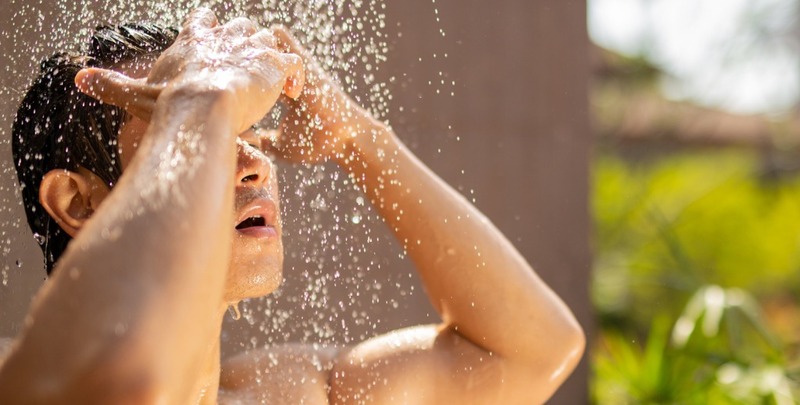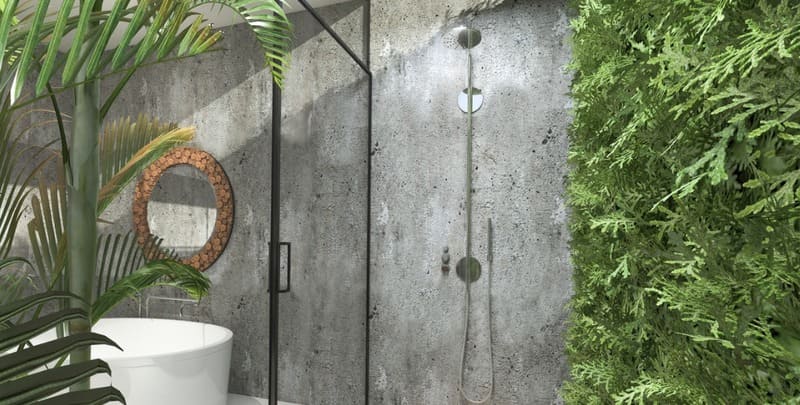
Outdoor Shower Ideas for Summer
Enjoying an outdoor shower on a warm, pleasant day can be a refreshing and tranquil experience. For some, it may even be considered a romantic activity.
However, before you decide to install a private outdoor shower in your backyard space, it’s important to weigh up the pros and cons to determine if it’s a valuable addition or just a temporary indulgence.
There are several factors to consider before installing an outdoor shower. Like any luxury item, there are plenty of options to consider. It’s certainly worth evaluating the advantages and disadvantages as well.
What Are Your Reasons For Installing An Outdoor Shower?
Choosing to shower in the open air instead of using your indoor shower can be a significant decision. There are several reasons why you might opt for showering in an outdoor oasis over the privacy of an indoor bathroom.
One of the primary reasons for installing an outdoor shower is if you have a swimming pool and/or spa, or frequently visit the beach. With an outdoor shower, you can rinse off the chlorine, salt and sand before walking through the door, all while drying off pleasantly in the warm air.
Outside showers are especially ideal for beachside vacation homes where sandy feet and wet bathing suits are commonplace.
Perfect on a Hot Day
Another reason to choose an outdoor shower is to take advantage of the summer months. If you are someone who enjoys exercising outdoors regularly – whether it’s walking (with or without the dog), running, cycling or other strenuous activities – you can relish the feeling of showering off the sweat in the fresh air. You can dry off in the sun, bask in the warmth, and return indoors feeling refreshed and revitalised.
Moreover, washing your furry companion outside can be a bonus, especially after a hot summer walk.
In some cases, having an additional shower can complement a busy household, even if you mainly use it during the warmer months. Showering outdoors can provide that extra space and convenience.
What Will an Outdoor Shower Cost?
When considering the cost of an outdoor shower, remember to take three key factors into account:
- the showerhead and fixtures
- the floor and landscaping
- plumbing materials and labour costs
The cost will vary depending on whether you want something with a good degree of privacy, or just a wall-mounted showerhead. The dedicated shower nook can potentially get expensive, with costs climbing depending on the scope of the work and the type of materials required.
A more basic outdoor shower is a more affordable option, depending on the quality and brand name of desired fixtures. Don’t forget that you’ll always need a plumber to connect the shower to the home’s water supply.

What Type of Outdoor Shower Do You Want?
The style you pick will depend on several of the factors we’ve already discussed. There are several options available for you to consider when adding this feature to your outdoor space.
While there are several designs, the primary types of outdoor showers are as follows:
- Freestanding shower: Freestanding outdoor showers are portable and you can place them anywhere that’s convenient for you. This type of shower is perfect for individuals who want to rinse off after swimming in the pool or coming back from the beach. It can also be stored away during winter months.
- Wall-mounted (open air): This type of outdoor shower is stationary and permanent. It needs to be installed by a qualified plumber. This option is suitable for those who want to shower after swimming at the pool or beach, or simply want to cool down on warm evenings.
- Wall-mounted (enclosed): An enclosed outdoor shower provides more privacy and can be used for purposes beyond rinsing off after exercise or swimming. It can be a refreshing way to start your day or freshen up after a long day at work.
If you’re considering a permanent outdoor shower, it’s crucial to take drainage into account. In some states, tempered water (a combination of hot and cold water) must flow into a sewer drain, not a stormwater drain. Your plumber should be aware of the regulations in your state.
Choosing the Perfect Outdoor Shower Design
If you are considering a permanent, wall-mounted outdoor shower for your backyard, it is important to choose a style and design that complements your desired aesthetic. It’s an important point of consideration, and could be the difference between choosing a rustic outdoor shower setup with a distinct country style, or something more contemporary and stylish for your outdoor oasis.
To withstand the elements, it is best to select metal fixtures. Options such as brass, stainless steel or copper fixtures provide added durability.
When it comes to the enclosure, glass panels can add a stylish touch. But for added privacy, they may need to be frosted and otherwise obscured. Frameless glass panels can create a sleek and modern look that complements the backyard.
The Importance of Privacy
Alternatively, wood panels and doors can also create an appealing look when paired with stainless steel bathroom accessories and can provide a greater sense of privacy.
A privacy screen can work in unison with your garden for a desirable modern style, while materials including wooden slats and rendered walls are suitable for a minimalist shower design.
No matter what design you choose, it is important to consider how it will fit into the overall design of your backyard. A well-designed outdoor shower can be both functional and stylish, and can enhance your outdoor living experience.
Will It Add Value to Your Home and Outdoor Space?
Adding a luxury item to your property will usually increase its value. But in the case of an outdoor shower, it can be a contentious issue.
If you’ve got a portable outdoor shower, it’s not an issue. Should you choose to put your home on the market, you can either leave it there or take it with you. It could even be something you need to negotiate with a potential buyer.
A permanent fixture could be seen as a selling point, particularly if you’ve got a swimming pool. A fully enclosed outdoor shower could also appeal to potential buyers, although some may see it as an unwanted feature that needs to be removed.
For the most part, many will likely see it as a positive feature that adds a summer holiday vibe to the warmer months.

Weighing Up the Pros and Cons of Outdoor Showers
Let’s explore the advantages and disadvantages of installing an outdoor shower.
The Benefits
- For avid swimmers, having an outdoor shower is a convenient addition to a backyard with a pool, or for those living near the beach. It provides a quick rinse-off option after a refreshing dip.
- On hot summer evenings, taking a cool shower outdoors is a refreshing and invigorating experience. It’s an ideal way to wash off sweat and dirt after a day of outdoor activities.
- Drying off naturally in the warm air after showering outside is a pleasant sensation. It’s a comfortable way to enjoy the sun while getting ready for the day.
- For households with frequent guests, an outdoor shower can be a unique experience. It provides a refreshing novelty that many guests will enjoy.
- Showering outdoors is also perfect for washing pets, especially on hot days or after a muddy winter walk.
The Drawbacks
- Installation can be expensive, requiring sturdy taps, a showerhead, and adequate drainage. It may not be a feasible option for those on a tight budget.
- Even if enclosed, outdoor showers may lack privacy. It can be an uncomfortable experience to venture outside in minimal clothing, especially first thing in the morning.
- Outdoor showers are typically only usable during the warmer months. During colder seasons, the shower may not be practical and may go unused for half a year.
- An outside shower requires maintenance to keep it clean and free of bugs, dirt and other outdoor debris.
All things considered, an outdoor shower can be an excellent addition to a backyard for those who enjoy the warm weather. It can become a quintessential summer feature, signalling the arrival of the sunny season like that first dip in the pool.
Please note: This information is provided for advice purposes only. Regulations differ from state to state, so please consult your local authorities or an industry professional before proceeding with any work. See our Terms & Conditions here.
Published: 2023-03-03

















